
Tuesday, December 21, 2010
And the Envelope Please....

Monday, December 6, 2010
Inalienable Obligation
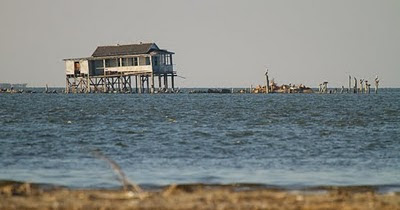
"Remember always that you not only have the right to be an individual, you have an obligation to be one"- Eleanor Roosevelt
"The rising ocean raises questions, too: What happens if the 61,000 Marshallese must abandon their low-lying atolls? Would they still be a nation? With a U.N. seat? With control of their old fisheries and their undersea minerals? Where would they live, and how would they make a living? Who, precisely, would they and their children become?" - more on the disappearing Marshalls
Wednesday, November 17, 2010
Pub, Pints and Petroleum Politics
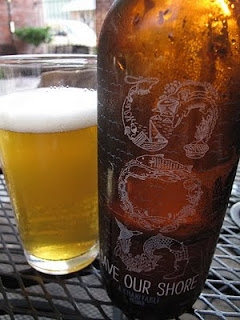
I don't know if I always had a journalist gene, or it's just something that intertwines itself within the double-helix for curiosity, but stories that don't walk a straight line fascinate me. Especially stories that don't just dip their toes, but wade waist deep into the confluence of environment, politics, conservation, money. Any one of those, combined with the erraticism of human nature, would be enough, but find that wedding of the waters and you better start looking at the local levies - something eventually will give. Maybe what intrigues me even more are the convolutions that the various channels take, and the moments of serendipity. Those moments I'm finding are often over a pint in a pub.
You can just call it drinking, but it's more. It's journalistic in perhaps the oldest sense of the craft. A filtering process refined in the great newspapers and radio days, and polished in the early years of television. Sorting on the fly what is and isn't helpful verses pure raconteur BS - which of course can always lend a bit of color. Out side the DC beltway, and unless you are overseas, there seems to be less hard stuff being drunk these days, but a couple craft beers, local brews, do just fine.
Some watering holes work better than others. Each locale has its flavor and approach. I'm not skilled at them all - yet. For example I'm not good with bad beer. In other words, fishing dock lounges are my Achilles heal. The kinda places where the lingering combination of grease and cigarette smoke veneer even the clean flatware, and the smell haunts you in your motel room even the next morning as you stare in disbelief at the paisley-plaid curtains (yes, somebody really did think combining those two was a good design idea.) Places where nothing on tap, or more often bottled, is darker going in that it is coming out. Beers often referred to by the person behind the bar as "beer product" and generally bear the label "lite". And all of the establishments start and end with someone's first name - women's names are the worst for me, they hold the promise of cleanliness going in, then dash your hope and smother your senses.
Yesterday afternoon I visited one of my favorite pubs here on New Orleans' Magazine Street - finally yielding to that little voice. The same little voice that over the years tells me, "talk to that guy or gal sitting next to you" and I finally relent to discover a valuable lead or relationship that far exceeds the cost of the local draft microbrew.
There were just two of us sitting outside at 4PM and serendipity killed the power on the outlet he was using. So laptop in one hand, pint in the other, here he came. Sharing an outlet bonds you in this digital age, the way a bad cab ride or train trip did a couple decades ago, or a five-day monsoonal rainstorm in the third-world still can.
An hour later, and half a pint (second round) remaining, we shut laptops and commented on the weather - snow up north in home towns. My home town, Portland, was his envy. After this was over he would like to head there. This, turned out to be the BP mess. Serendipity. Much of the next several minutes was peppered with him saying, "off the record", but, in their turn comments, facts and anecdotal debris floated down several of the above mentioned channels, pushing me closer to the confluence of this oil mess. Information like, there are places people just aren't looking, "there's $5 billion in charter fishing in the Gulf", why isn't anyone talking to these guys. Yes, follow the money.
I'm headed for Grand Isle this weekend based on that last half pint. My Nawlins "Deep Throat" connected me to other activities, separate, out of Grand Isle. A coastal confluence. All channels seem to be flowing south to Grand Isle - now if the island just had a good pub!
PS - I debated on where to post this, here or over on my general blog Perambulations - in the end both - it's as much a Louisiana/Gulf story as general journalists journey.
Thursday, November 11, 2010
"...a little rain must fall,"


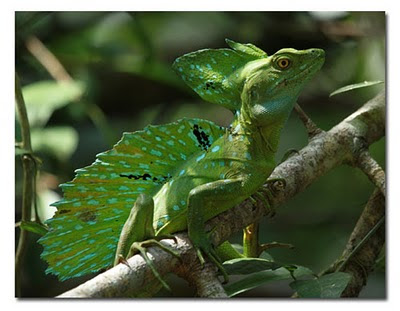
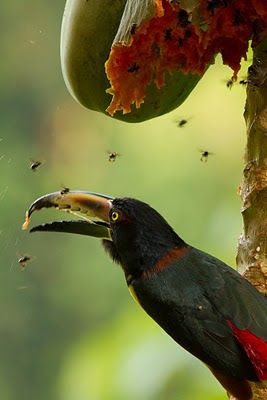


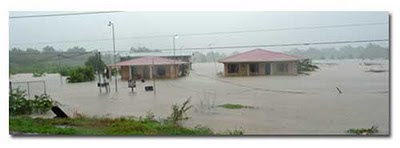
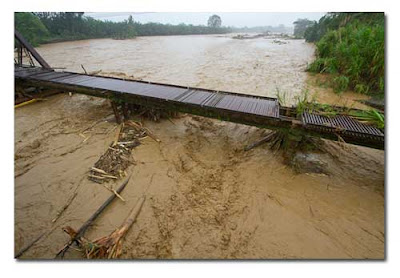

Tuesday, November 9, 2010
Only One Hummingbird Still Makes A Magical View




Friday, October 22, 2010
TED Prize Goes to Mr Anonymity
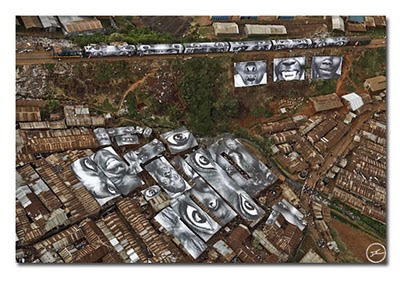
"As he remains anonymous and doesn't explain his huge full frame portraits of people making faces, JR leaves the space empty for an encounter between the subject/protagonist and the passer-by/interpreter."
Thursday, October 21, 2010
Veolia Environment Wildlife Photographer of the Year
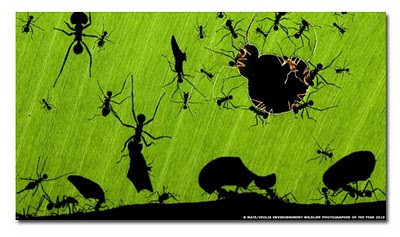 The annual celebration of images from nature, the Veolia Environment Wildlife Photographer of the Year, has released its 2010's top selection (the word winner suggests the others are losers - don't like it) a wonderful dance of ants by Hungarian photographer Bence Máté. My favorite ants - tropical leaf cutters. He said, 'I love the contrast between the simplicity of the shot itself and the complexity of the behaviour.' From the posting on the gallery site it says Máté's Costa Rican photo had its trials, "Lying on the ground to take the shot, he also discovered the behaviour of chiggers (skin-digesting mite larvae), which covered him in bites."
The annual celebration of images from nature, the Veolia Environment Wildlife Photographer of the Year, has released its 2010's top selection (the word winner suggests the others are losers - don't like it) a wonderful dance of ants by Hungarian photographer Bence Máté. My favorite ants - tropical leaf cutters. He said, 'I love the contrast between the simplicity of the shot itself and the complexity of the behaviour.' From the posting on the gallery site it says Máté's Costa Rican photo had its trials, "Lying on the ground to take the shot, he also discovered the behaviour of chiggers (skin-digesting mite larvae), which covered him in bites."Sunday, October 10, 2010
the Color of Joy
Tuesday, September 28, 2010
iPadding the Future
 (Gerry - since posting this Paul Melcher on his blog Thoughts of a Bohemian has posted Oct. 20th, "Beyond Metadata" worth a a read)
(Gerry - since posting this Paul Melcher on his blog Thoughts of a Bohemian has posted Oct. 20th, "Beyond Metadata" worth a a read)The question that publishers should be asking themselves regarding the iPad, and other tablet platforms, is not “how do we put our magazine on this device?” It should be “how can we best replicate the brand experience of our title, using the full suite of technological advances afforded by this new platform?” Follow up questions would include notions that would have previously been considered bizarre, like “What does our magazine sound like?” and “How many video advertisements is too much next this block of type?” (Because video stimulation hits the lizard part of the brain much quicker than the most well crafted and moving essay ever will.) It’s sad, but true.
Friday, September 17, 2010
The Unseen Sea
 It's been rather quiet over here since I started work in the Gulf - literally and figuratively I have been swamped. I fly back to Portland next week and will catch up with several posts in the works for here and my Gulf specific blog. In the meantime Jenn sent me this very cool site with a time lapse piece on the fog and cloud formations in and around San Francisco which I wanted to share called The Unseen Sea by Simon Christen - enjoy!
It's been rather quiet over here since I started work in the Gulf - literally and figuratively I have been swamped. I fly back to Portland next week and will catch up with several posts in the works for here and my Gulf specific blog. In the meantime Jenn sent me this very cool site with a time lapse piece on the fog and cloud formations in and around San Francisco which I wanted to share called The Unseen Sea by Simon Christen - enjoy!
Wednesday, August 18, 2010
Gulf Oil Spill Project
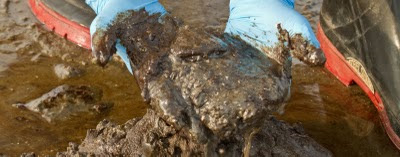
Tuesday, August 3, 2010
Gross Negligence - by whom?
 You don't need to sit down for this, in fact most Americans won't even pay attention to the news, but here it comes...
You don't need to sit down for this, in fact most Americans won't even pay attention to the news, but here it comes...The BP oil spill is the new world record holder for human inflicted environmental disasters. The spill has released just under five million barrels - an estimated 210 million gallons - of oil. That's 20 times more oil than was released during the Exxon Valdez spill--which previously held the record for the worst oil spill on U.S. territory. On top of that we have no estimate on the volume of methane gas poisoning the waters in and around the wellhead.
That figure "blows out of the water" the 3.3 million barrels released during the world's previous worst spill, the Ixtoc spill in the Bay of Campeche off the eastern coast of Mexico in 1979.
Writers Campbell Robertson and Clifford Krauss for the New York Times reported, the official estimate of the amount of oil spill means that BP faces fines of anywhere between $5.4 billion and $21 billion, depending on the degree to which federal investigators decide that gross negligence sparked the spill.
"Gross negligence", hmmmm?
Most Americans would say that's pretty obvious, isn't gross negligence spelled B P?
Negligence, yes, "gross", well I'm undecided. Certainly BP pushed the limits of safety, corporate ethics, destructive capitalism, and we will find out over time a whole host of other practices were compromised or simply toss overboard. But the blame for gross negligence maybe rests more broadly.
For true gross negligence I think we could start with elected officials over the past four to five decades who have failed to implement a comprehensive energy management plan for a nation (and in turn a world - we have been the leaders like it or not.) And then to the lobbying companies like auto makers who have slaved to profit margins, and insured those elected officials played along. But ultimately we have to look in our own rear-view mirrors at the people behind the wheel. WE. We elected official and didn't hold them accountable. We bought cars that ran on oil. We scream everytime gas smells $3/gal. - make it cheaper at "any" cost. We insured the system didn't change because it might be uncomfortable.
WE, you and me, are the ones responsible for the gross negligence.
Real gross negligence is being done by the media and the public indifference to a living planet that, from a human perspective, is being pushed to the limits of survivability. Just this past week the media has begun down playing the "great disaster" they so jumped on a couple months ago: "Where is all the oil?" an AFP headline asked. Time magazine ran a piece suggesting that the environmental impact of the spill has been "exaggerated." The New York Times ran a story that said the "Gulf oil spill is vanishing fast." Yahoo news ran a story suggesting that oil-starved microbes are gobbling up the oil. Anderson Cooper's CNN show ac360 is one of the few that has continued daily reporting from the Gulf Coast - and he too will likely pack up the mobile unit this week as BP looks to finally shut the well.
Brett Michael Dykes, who writes the Upshot for Yahoo News, reported that Doug Radar, the chief ocean scientist for the Environmental Defense Fund, told the Times Picayune that millions of gallons of oil remain unaccounted for.
"If you go back and look at the sheer amount of oil dumped - 60,000 barrels a day for 87 days - you get about 220 million gallons," Radar said. "Of that, 11 million gallons were burned and 30-some million were collected, meaning about 50 million gallons were eliminated. That leaves you about 175 million gallons of oil-based pollution loose in the Gulf. And when it degrades from the thick stuff you can see, that doesn't mean it's all gone. There's still an untold amount of toxins from that oil in the marine environment."
And what about that web-of-life we learned so much about in elementary school? That's the great mystery. Long-term it becomes broken links and chain-reactions, many beyond our best guesstimates. Researchers have already recorded that the Gulf's traditional summer dead zone - the annual dip in oxygen levels along the Gulf shoreline (due to Mississippi River runoff carrying agricultural fertilizer waste) - is twice as large as it was last year, representing an area the size of Massachusetts - stretching 7,722 square miles across Louisiana's coast well into Texan waters, scientists with the Louisiana Universities Marine Consortium announced yesterday (Monday).
PS - and what about that "other" giant nation consuming oil. China has overtaken the United States as the world's biggest producer of greenhouse gases and biggest energy consumer, but they are searching for solution to the unsustainable -China Plans Huge Buses That Can DRIVE OVER Cars
Monday, August 2, 2010
Being American - None of US are Islands Alone
 I saw a movie last night that struck several cords from joy to frustration to anger. All about people. Not one kind of people, them over there, they, but all people. And in that sense about Americans. Being American. What that means. What ever that means?
I saw a movie last night that struck several cords from joy to frustration to anger. All about people. Not one kind of people, them over there, they, but all people. And in that sense about Americans. Being American. What that means. What ever that means?It's odd to have an island named after you that represented a door, a passage way, a gate to all those people, regardless of origin, color, perspectives, experiences. A word that dangled in the desire of faraway sleepless nights and unfulfilled dreams. Ellis Island. To so many it launched a freedom granted to you at birth, for no price, and you have never in all your global wanderings stepped foot there. Yes there, on that small, originally 5 acres, of terra firma that somehow meant more than all others; between 1892 to 1954 millions of people, a planet's worth, created the most remarkable crucible of human diversity our world has ever known: mixed with the poets and the thinkers, the scientists and the musicians, and farmers and shopkeepers, there were also bigots and hate mongers and those who would have you believe that theirs is the only American blood that flowed out of that remarkable crucible - that's the price of diversity - there are mosquitoes in the diverse beauty of the rainforest, and some of them carry malaria.
The Visitor is about the potential of continuing to give life to that remarkable crucible. The Visitor is a movie every American, illegal, legal, or by the luckiest miracle on Earth - of which you had no say in - you were born here. You paid no price for your luck - you can only pay it forward. And do so like The Visitor "with impressive grace and understatement, resist potential triteness and phony uplift." Qualities you wish were the gifts of being born American.
I agreed with one reviewer who wrote, "The most remarkable part of The Visitor is the way it organically shows the way life can change un-expectantly, unfairly and without warning and does it with real, raw emotion. Just when you think you've figured out what the movie is about, you [are] slapped with a new reality. It is frightening, timely and angering. Even the ending, which is not the typical movie ending, is emotive in a subtle and realistic way. I was not overwhelmed or underwhelmed by the movie, I was perfectly whelmed; a task indeed."
Like living as an American.
The Visitor was released in 2007, that year roughly 1 million immigrants entered America, none of them look like you and me, all of them look like US. That same year 283,000 were detained - 85% of them did not have access to a lawyer - their crime was dreaming of the crucible. That year there were 10,350 immigrant children placed in the custody of the Department of Health and Human Services.
The goal of all this? To protect US from terrorism, the them, the there. The price? The crucible crumbles and diversity dies.
Friday, July 23, 2010
BP Announces New Summer Movie Release: Silence of the Scientists
Here goes... I'll start with a question.
Is there a time when something is so off, its principals so clearly skewed as apparent by its actions (all that we know) in which we as a society need to stop and question its value in existing? Is it something we really need in our lives, in our world?
My background, my experiences are in nature, observing it, studying it, contemplating it, soliciting other perspectives on it. In nature the above question would be rhetorical at best, ultimately moot. The old saying goes "Nature abhors a void" but nature equally abhors anything mindlessly destructive to the system, all other life. The global petroleum company BP is treading down that path and perhaps it's time we as a society pause and consider its value in our lives, in our world.
In the past couple months the following information about BP activities has come to public light, and it's clear much more remains receding in the dim recesses.
- BP abandoned almost all prudent safety procedures in deep water drilling in the Gulf of Mexico.
- BP paid or insured few if any regulations governing their drilling activities in the Gulf of Mexico were know or under the scrutiny of the licensor (us hence the US).
- BP continually has under reported the extent of the spill scope.
- BP has, in coercion with local and government officials gagged the flow of information about the extent of damage along the Gulf Coast, including using coerced/paid local law enforcement to challenge, threaten and exclude journalists.
- BP has pressured government in the UK for release of a know terrorist who's actions killed
- BP is, still, working with the Lybian government on who's side it was pressuring the UK government to open the flow of oil leases.
- BP is current trying to buy the silence of scientists regarding their research into the Gulf spill damage.
BP said it had hired more than a dozen scientists "with expertise in the resources of the Gulf of Mexico," according to a statement given to the BBC. That's great, get real scientists at work on this mess. But that isn't their objective apparently. According to a BBC report:
Bob Shipp, the head of marine sciences at the University of South Alabama, said BP's lawyers had approached him and wanted his whole department.
"They contacted me and said we would like to have your department interact to develop the best restoration plan possible after this oil spill," he said.
"We laid the ground rules - that any research we did, we would have to take total control of the data, transparency and the freedom to make those data available to other scientists and subject to peer review.
"They left and we never heard back from them."
Nelson warned BP's actions could be "hugely destructive".
"Our ability to evaluate the disaster and write public policy and make decisions about it as a country can be impacted by the silence of the research scientists who are looking at conditions," he said.
"It's hugely destructive. I mean at some level, this is really BP versus the people of the United States."
So where does it stop? I return to my original question,
Is there a time when something is so off, its principals so clearly skewed as apparent by its actions (all that we know) in which we as a society need to stop and question its value in existing? Is it something we really need in our lives, in our world?
Sounds ludicrous you think. We would just remove a company from our planet. Why not? BP now equates to BioPoison - life threatening. It's not infected every last worker, but clearly it has become what all corporations run the risk of, slipping off the tightrope, losing balance. BioPoison infects the inner ear, one no long hear the voice of reason and right, one loses balance. Their record is illustrating they have been tiptoeing that thin tightrope corporations balance on so precariously, only maintaining balance based on the collective conscious of a few men and women to listen to the inner ear, and realize their decisions do destroy with equal severity as they do value.
BP has lost balance, they're falling and like any one who does they desperately flail about, grasping at anything and everyone for hope of stability. The result is they take us down with them. Despite our hardwired human urge to save - this time we need, hold back our hand, look away, to let them go.
